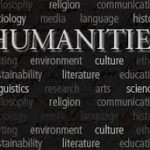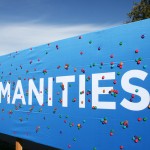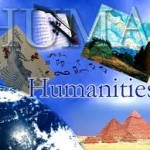
If you’re not realllllly sure what the humanities are, you’re in good company. When I tell folks I work w/ the state Humanities Council, they look almost as uneasy as when I tell them I write poetry (I don’t confess to either much in public gatherings). They’re just so… humanist, those humanities. Or so we’ve come to believe, egged on by legislators who find nothing to profit from in the arts & sciences that make us human.
Me? I’d sooner give up air conditioning in a hot Okie August than give up the humanities. In case you’re wondering, almost everything you like falls under that broad umbrella term: Language (try doing w/out THAT), law (or THAT), faith (so much bigger than any single one of us), philosophy (to make sense of it all), ethics (so we do it with compassion), archaeology, architecture, music (what would we do w/out music?), history, the environment, the sciences, media… It’s a loooong list of very human interests & accomplishments.
Sooooo, if you were engaged in this wondrous field, wouldn’t you want to share? Wouldn’t you want to take something this cool to everyone? But academics (and I’ve been one for years, as I am reminded at every family gathering…) often fail us here. And even though I am proud of my hard-earned degrees, and the research I’ve done over the years in sometimes abstruse fields. But I work equally hard at taking that knowledge home, as it were. Finding ways to use it w/ folks who may think they could care less about poetry, or Ezra Pound, or translations, or gender, or any of the ‘odd’ things I’ve obsessively read.

Why is my passion for bees okay, but not my obsession w/ poetry? I have (conservative count here) 20 or more books on bees. This doesn’t include the class I took, the listservs I lurk on, or the books I checked out from the library. That’s perfectly acceptable, most of the time (although I do get some teasing). But the lengthy bib I read on the poet Ezra Pound, translation, Chinese culture, and assorted arcane topics? And put to use in an article for publication? That’s weird, by popular acclaim.
 Maybe some of you who read this blog are academics, gleaning knowledge from dusty tomes, or the tiny print of databases. Perhaps you toil in the twilight catacombs of old libraries, cruising shelves as few young scholars do today: finger on each title, looking all through the 811s to see what might be useful. I found some great books that way…
Maybe some of you who read this blog are academics, gleaning knowledge from dusty tomes, or the tiny print of databases. Perhaps you toil in the twilight catacombs of old libraries, cruising shelves as few young scholars do today: finger on each title, looking all through the 811s to see what might be useful. I found some great books that way…
If you ask academics about ‘taking it home,’ they tell you, I’m writing a book. Or, there’s this conference. Worst is when the book AND the conference are international, and Americans can’t afford the conference and won’t see the book release. How is that taking it home??
Here’s my take on the schism between ‘pointy-heads’ (academics) and ‘regular’ folks: it’s a lot OUR fault. As in, why WOULD folks who don’t have time to read a book for pleasure find my work on a crazy guy who translated Chinese philosophers worth the time of day? It’s MY job to get out there and show how it might apply, how knowing about poetry — not just Pound’s — is FUN. Because most of us enjoy things we see as fun, right? And if you can’t make your passion accessible, interesting, and comprehensible to the hoi polloi? Maybe you deserve obscurity.

A quick aside: I am NOT against scholarship, of even the most abstruse sorts. Yesterday I read the heart-expanding biography of a 2015 MacArthur Genius Grant fellow: Yitang Zhang. Almost 60, Zhang just busted the chops of every major league math geek in the world. He SOLVED a long-unsolved math problem on ‘bound gaps’ (and nope — I don’t really get ‘bound gaps’; something to do w/ prime numbers, which are utterly loveable…and I mean that), a problem long-thought to possibly be insolvable.
Zhang pretty much doesn’t care if anyone else loves his work — he cares so little about such things that he’s teaching calc, not a ‘prestigious’ university job. But it leaves him free to work on his passion. And I’m GLAD, because we need Zhangs. We need those mono-focused obsessives who home in on a single project, and drill through the centre of the earth.
But we also need to hear about them. And it took the author of the article (Alec Wilkinson) to help me see & understand Zhang and his complex work’s ineffable beauty. THAT’S what good sharing does. And we need a LOT more of it, America. So that we bridge these schisms and chasms and even the huge potholes that separate us. Because w/out the bridges from what you know that only you really know, to what I can find interesting, we are never going to meet at the table. And that would be a huge shame. Pound, and poetry, and bees, and Zhang’s bounds of primes, are pretty cool. I promise.

